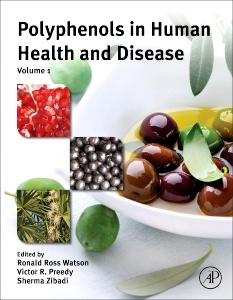Description
Polyphenols in Human Health and Disease
Coordinators: Watson Ronald Ross, Preedy Victor R., Zibadi Sherma
Language: English
Subject for Polyphenols in Human Health and Disease:
1418 p. · 21.6x27.6 cm · Hardback
Description
/li>Contents
/li>Readership
/li>Biography
/li>
Polyphenols in Human Health and Disease documents antioxidant actions of polyphenols in protection of cells and cell organelles, critical for understanding their health-promoting actions to help the dietary supplement industry. The book begins by describing the fundamentals of absorption, metabolism and bioavailability of polyphenols, as well as the effect of microbes on polyphenol structure and function and toxicity. It then examines the role of polyphenols in the treatment of chronic disease, including vascular and cardiac health, obesity and diabetes therapy, cancer treatment and prevention, and more.
- Explores neuronal protection by polyphenol metabolites and their application to medical care
- Defines modulation of enzyme actions to help researchers see and study polyphenols’ mechanisms of action, leading to clinical applications
- Includes insights on polyphenols in brain and neurological functions to apply them to the wide range of aging diseases
Part I: Biomodification of polyphenols and mechanisms of action Overview of polyphenols and health research Absorption, metabolism and bioavailability of polyphenols Effect of microbes on polyphenol structure and function Polyphenol actions as enzyme modulators in health Oxidation and antioxidant activity of polyphenols Toxicities and identification of polyphenols
Part II: Polyphenols in prevention and treatment of chronic disease Polyphenols and vascular health Cardiac health and polyphenols Polyphenols in therapy of obesity and diabetes Polyphenols in brain and neurobiology health Cancer prevention and treatment by polyphenols Inflammation and immune functions Diverse diseases and physiological states modified by polyphenols
Nutritionists, dieticians, and clinical researchers interested in how the mechanisms of polyphenols contribute to the prevention and treatment of disease.
Victor R. Preedy BSc, PhD, DSc, FRSB, FRSPH, FRCPath, FRSC is a staff member of the Faculty of Life Sciences and Medicine within King's College London. He is also a member of the Division of Diabetes and Nutritional Sciences (research) and the Department of Nutrition and Dietetics (teaching). Professor Preedy is also Director of the Genomics Centre of King's College London.
Professor Preedy graduated in 1974 with an Honours Degree in Biology and Physiology with Pharmacology. He gained his University of London PhD in 1981. In 1992, he received his Membership of the Royal College of Pathologists and in 1993 he gained his second doctorate (DSc), for his outstanding contribution to protein metabolism in health and disease. Professor Preedy was elected as a Fellow to the Institute of Biology in 1995 and to the Royal College of Pathologists in 2000. Since then he has been elected as a Fellow to the Royal Society for th




